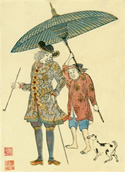Isaac Titsingh FRS (10 January 1745 in Amsterdam – 2 February 1812 in Paris) was a Dutch surgeon, scholar, merchant-trader and ambassador.[1]

Japan, 1779-1784
changeAt Dejima Island in Japan, Titsingh was the head of the Dutch East India Company(Vereenigde Oost-Indische Compagnie or "VOC" in Dutch) during 1779-1780, 1781–1783, and 1784. In these years, the Japanese policy of seclusion of isolation (sakoku) limited all contact with non-Japanese.[2] In this highly controlled context, the VOC traders became the sole official conduit for trade and for scientific-cultural exchanges between Japan and the West.
Titsingh is believed to have been the first Freemason in Japan.[3]
India, 1785-1792
changeIn 1785, Titsingh was appointed Director of the VOC trading post at Chinsura in Bengal. He formed a friendship with William Jones, the philologist and Bengal jurist.[4]
Batavia, 1792-1793
changeTitsingh’s return to Batavia (now Jakarta, Indonesia) led to new VOC positions as Ontvanger-Generaal (Treasurer) and later as Commissaris ter Zee (Maritime Commissioner).
In Batavia, Titsingh met with the British Ambassador do China, Lord Macartney who was travelling to the Imperial Court in Peking. Titsingh encouraged McCartney to give up on a planned expedition to Japan in 1793.[5]
China, 1794-1795
changeTitsingh was appointed Dutch Ambassador to the court of the Emperor of China. He was in Peking for the celebrations of the sixtieth anniversary of the reign of the Qianlong Emperor. In Peking, the Titsingh delegation included Andreas Everardus van Braam Houckgeest[6] and Chrétien-Louis-Joseph de Guignes.[7]
Titsingh is believed to have been the first Freemason in China.[8] and the only to be received personally in the court of the Qianlong emperor.
Return to Europe, 1796-1812
changeAmong the Japanese books brought to Europe by Titsingh, was a copy of Sangoku Tsūran Zusetsu (三国通覧図説, An Illustrated Description of Three Countries) by Hayashi Shihei (1738–93). This book, which was published in Japan in 1785, deals with Chosen (Korea) and the kingdom of Ryukyu (Okinawa) and Ezo (Hokkaido).[9] In Paris, the text represented the first appearance of Korean han'gŭl in Europe.[10]
After his death
changeTitsingh died in Paris (February 2, 1812), and he is buried in Père-Lachaise cemetery.[11]
After Titsingh's death, the printed original and Titsingh's translation were purchased by Jean-Pierre Abel-Rémusat (1788–1832) at the Collège de France.[12]
In 1832, Julius Klaproth (1783-1735) at the Institut Royal publish his edited version of Titsingh's translation.[13]
Selected works
changeIn a statistical overview derived from writings by and about Seki Takakau, OCLC/WorldCat includes roughly 90+ works in 150+ publications in 7 languages and 1,600+ library holdings.[14]
- "Bereiding van saké en soya," in Verhandelingen van het Bataviaasch genootschap van Kunsten en Wetenschappen (1781)[15]
- Cérémonies usitées au Japon pour les mariages et les funérailles (1819).[1]
- Mémoires et anecdotes sur la dynastie régnante des djogouns, souverains du Japon (1820),[1]
- Illustrations of Japan (1822)[15]
- Bijzonderheden over Japan (1824)[15]
- Annales des empereurs du Japon (1834)[15]
Related pages
changeReferences
change- ↑ 1.0 1.1 1.2 Nussbaum, Louis-Frédéric. (2005). "Isaak Titsingh," Japan Encyclopedia, p. 966.
- ↑ Edo-Tokyo Museum. (2000). A Very Unique Collection of Historical Significance: The Kapitan (the Dutch Chief) Collection from the Edo Period -- The Dutch Fascination with Japan, p. 207.
- ↑ Far East Lodge No. 1, Archived 2012-01-18 at the Wayback Machine "A Brief History of Freemasonry in Japan;" Archived 2011-10-09 at the Wayback Machine excerpt, Titsingh "is believed to be the first mason to visit Japan" in 1779
- ↑ Jones, William. (1835). Memoirs of the life, writings and correspondence of Sir William Jones, by Lord Teignmouth. London.
- ↑ Macartney to Dundas, 23 December 1793, British Library, India and Oriental, Factory Records, China, 1084 G/12/20.
- ↑ van Braam Houckgeest, Andreas Everardus. (1797). Voyage de l'ambassade de la Compagnie des Indes Orientales hollandaises vers l'empereur de la Chine, dans les années 1794 et 1795; see also 1798 English translation: An authentic account of the embassy of the Dutch East-India company, to the court of the emperor of China, in the years 1974 and 1795, Vol. I. Archived 2009-02-15 at the Wayback Machine
- ↑ de Guignes, Chrétien-Louis-Joseph (1808). Voyage a Pékin, Manille et l'Ile de France.
- ↑ Screech, Timon. (2006). Secret Memoirs of the Shoguns: Isaac Titsingh and Japan, 1779-1822, p. 58; excerpt, "Titsingh became the first Freemason ever to set foot in China...."
- ↑ Cullen, Louis M. (2003). A History of Japan, 1582-1941: Internal and External Worlds, p. 137.
- ↑ Vos, Ken. "Accidental acquisitions: The nineteenth-century Korean collections in the National Museum of Ethnology, Part 1," Archived 2012-06-22 at the Wayback Machine p. 6.
- ↑ Titsingh's gravestone reads: "Ici repose Isaac Titsingh. Ancien conseiller des Indes hollandaises. Ambassadeur à la Chine et au Japon. Mort à Paris le 2 Février 1812, agé de 68 ans." ("Here lies Isaac Titsingh, formerly a councillor of the Dutch East India Company, Ambassador to China and to Japan. Died at Paris the 2nd of February 1812, aged 68 years.")
- ↑ Kublin, Hyman. "The Discovery of the Bonin Islands: A Reexamination," Annals of the Association of American Geographers, Vol. 43, Issue 1 (March 1, 1953). p. 35.
- ↑ Pouillon, François. (2008). Dictionnaire des orientalistes de langue française, p. 542.
- ↑ WorldCat Identities: Titsingh, Isaac 1744-1812
- ↑ 15.0 15.1 15.2 15.3 Boxer, C. R. (1936). Jan Compagnie in Japan, 1600-1850: an essay on the cultural, artistic and scientific influence exercised by the Hollanders in Japan from the seventeenth to the nineteenth centuries, p. 172.